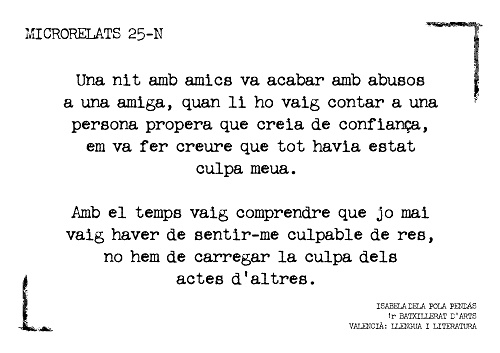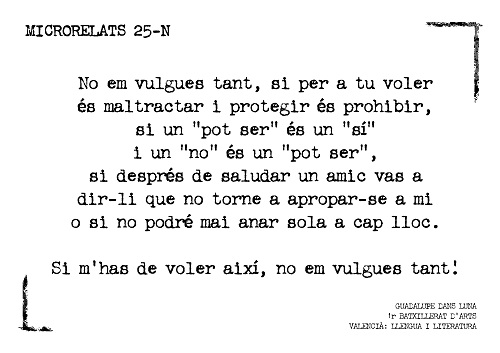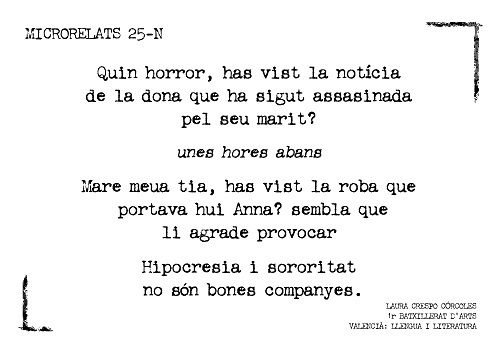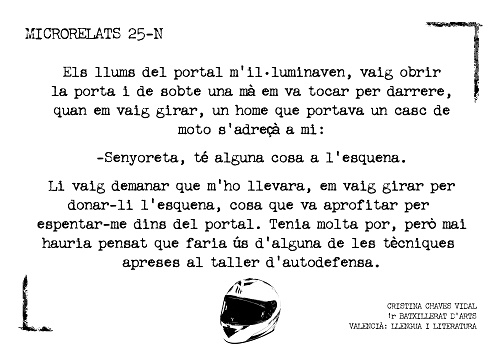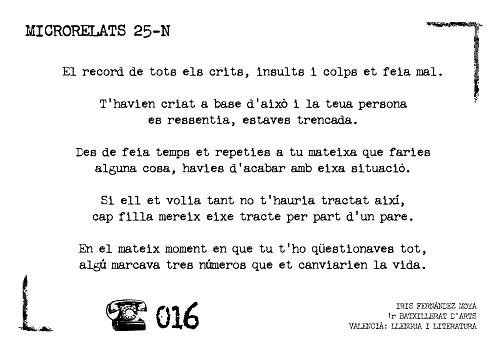
Microrrelato
ESTELA GARCÍA GARCÍA. El último día de clase la profesora Laura de castellano hizo para nosotros, la clase de 2ºB grupo 1, una actividad grupal para que elaboráramos nuestras propias historias. Primero jugamos a un “alto el lápiz”. De este juego seleccionamos las palabras clave para elaborar nuestras historias, después cuando las terminamos las leímos e hicimos una votación para decidir cuál de las historias era la favorita.
Todas eran muy originales y estaban bien redactadas pero la que más nos gustó fue la de nuestra compañera Julia Fernández.
Os invito a leerla. ¡Espero que os guste!
Julia Fernández

No hace mucho tiempo, vivía en Suecia una chica llamada Sofía. Ella nació en Soria, pero, se mudó a sus 28 años a Suecia.
Ella desde muy pequeña le decía a sus padres que veía cosas que no eran muy normales. Veía todo tipo de sombras, de personas, de animales…
Cuanto más mayor se hacía más reales eran las sombras.
Sus padres decidieron llevarla al médico, pero el médico dijo que eran alucinaciones suyas y que no tenía cura.
Su padre le regaló un silbato para que cuando las sombras se acercaran lo soplara a ver si desaparecían, aunque sea por un periodo de tiempo. El silbato funcionaba tal y como dijo su padre.
En Suecia encontró a un chico con el mismo problema que ella y le contó que bajo ningún concepto dejara que le tocaran las sombras porque si lo hacía, moriría al instante, como le pasó al hermano del chico.
Una noche, Sofía estaba cenando sopa y volvió a ver las sombras. esta vez ella la pudo distinguir a la perfección. La sombra tenía forma de sapo, pero no un sapo cualquiera, era un sapo gigante, de unos dos metros de alto.
Sofía buscó el silbato pero no lo encontró, se lo había dejado en su habitación.
Mientras el sapo se acercaba empezó a sentir una soledad enorme y empezó a acordarse de su familia y amigos, sabiendo que no los volvería a ver.
El sapo la tocó y desapareció al instante.
Desde que pasó eso nadie recuerda haber conocido a Sofía, ni sus padres ni sus amigos.
La cueva rupestre de 1º ESO B
El arte rupestre de 1º ESO B
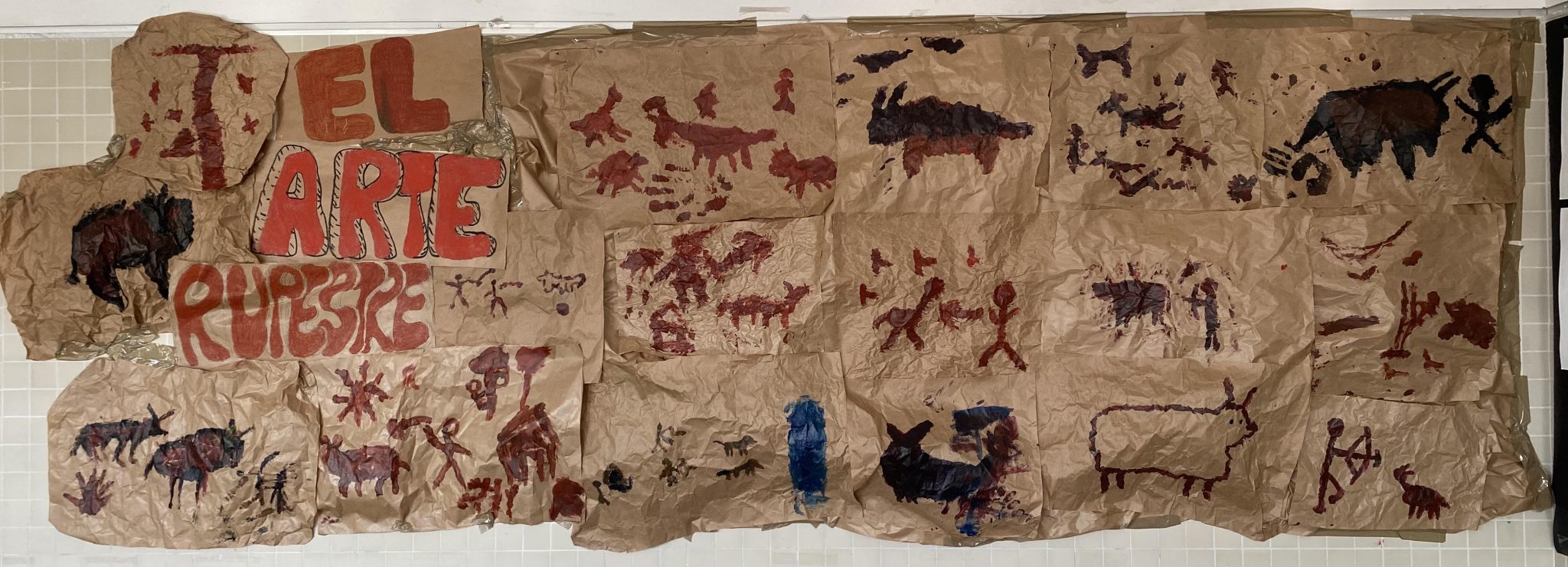
LAURA VIVANCOS GONZÁLEZ, 1º ESO B. Los de la clase de 1B, el 4 de diciembre, hemos realizado una actividad muy divertida, que ha consistido en pintar con los dedos animales, personas etc.., para imitar las cuevas de la prehistoria, el Neolítico y el Paleolítico.
Para pintar hemos usado pintura marrón, negra y roja.
Para imitar las rocas hemos usado papel marrón y lo hemos arrugado.
Ha sido muy divertido. Lo recomiendo mucho. Ahora en nuestra clase tenemos una cueva Paleolítica.
Louise Glück
Do you know Louise Glück, the recent winner of Nobel Prize of Literature?
Elena Serrano, from 2nd BAC E, hekp us to know her in this magnificient article witten in English and translated by herself
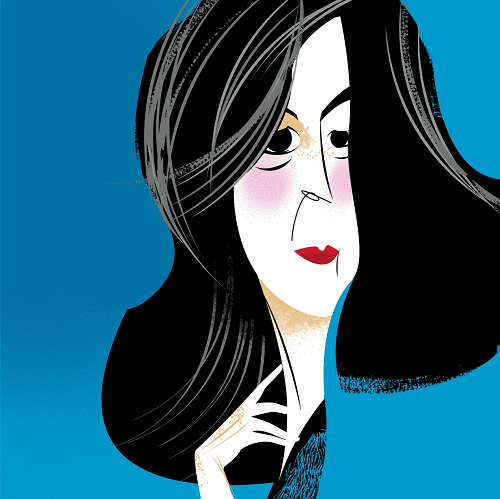
ELENA SERRANO, 2nd BAC E. The Swedish Academy has chosen Louise Glück for the extraordinary Nobel prize in literature , therefore, Glück has become the first American woman to obtain this prestigious award for literature in 27 years. The poetess is also the 16th woman to ever win a Nobel prize.
Louise Elisabeth was born on the 22nd of April, 1943 in New York City and was brought up in Long Island. She was the elder of two surviving daughters of Daniel and Beatrice Glück. Beatrice was of Russian Jewish descent and Daniel was of Hungarian Jew descent. Louise´s grandfather aspired to be a writer, but regretfully didn’t make a living out of it after all. However, his love for writing was clearly handed down as the young poetess inherited an undeniable way with words. Glück´s family made sure that she valued and acknowledged classic literature, mythology and the arts. Consequently, she started writing poetry at a very young age based on the knowledge she gained.
Unluckily, Louise developed anorexia nervosa during her teenage years. Anorexia Nervosa should be understood to indicate the psychological disorder that involves deliberate self-starvation due to an irrational fear of gaining weight and a distorted body image. This became a true struggle for her. She connected this illness to the death of an elder sister, an event that occurred before her birth. Glück began treatment and rehabilitation and spent the following 7 years in therapy to overcome this tragedy.
Louise Glück on her struggle with anorexia:
“The tragedy of anorexia seems to me that its intent is not self-destructive, though its outcome so often is. Its intent is to construct, in the only way possible when means are so limited, a plausible self. But the sustained act, the repudiation, designed to distinguish the self from the other also separates self and body …
I was immensely fortunate in the analyst my parents found. I began seeing him in the fall of my senior year of high school; a few months later, I was taken out of school. For the next seven years, analysis was what I did with my time and with my mind; it would be impossible for me to speak of education without speaking of this process.
I was afraid of psychoanalysis in conventional ways. I thought what kept me alive, in that it gave me hope, was my ambition, my sense of vocation; I was afraid to tamper with the mechanism … Periodically, in the course of those seven years, I’d turn to my doctor with the old accusation: He’d make me so well, so whole, I’d never write again. Finally, he silenced me; the world, he told me, will give you sorrow enough.”
As a result of her delicate condition, Louise did not go to college as a full-time student but she took poetry classes and was part of poetry workshops.
Around this time of her career, she began to publish her first collection of poems, Firstborn, reviewed as “ hard, artful, and full of pain”.
After the critical attention she received for her art, Glück suffered a severe case of writer’s block which she got through once she started teaching poetry in Vermont. The poetess collected new pieces in her second book, The House on Marshland, considered her breakthrough work.
In 1973, she had her only child, Noah, and divorced her husband. Years later, Glück married the author John Dranow.
Around 1980, Louise Elisabeth published her third collection of poems, Descending Figure. Her work was severely criticized for its tone and topics. In spite of this, a vast majority found that she grew considerably from her previous work. Shockingly, a fire destroyed Glück´s home and most important possessions taking her to writing her award-winning collection, The Triumph of Achilles, a “cleared, purer and sharper” work of art according to The New York Times. Out of the whole collection, Mock Orange is a very special piece considering as it is a feminist anthem.
It is not the moon, I tell you.
It is these flowers
lighting the yard.
I hate them.
I hate them as I hate sex,
the man’s mouth
sealing my mouth, the man’s
paralyzing body—
and the cry that always escapes,
the low, humiliating
premise of union—
In my mind tonight
I hear the question and pursuing answer
fused in one sound
that mounts and mounts and then
is split into the old selves,
the tired antagonisms. Do you see?
We were made fools of.
And the scent of mock orange
drifts through the window.
How can I rest?
How can I be content
when there is still
that odor in the world?
In 1984, Louise suffered the loss of her father, an event that prompted her to create Ararat, a brutal, emotion-filled book.
She also had to go through a complicated second divorce. This difficult period helped her channel her feelings and experiences in her writing. As a result of this, she published an assemblage of essays called Proofs of Theories: Essays on Poetry. She followed this with more collections of poetry based on her failed marriages and the nature of love.
“ At the end of my suffering , there was a door.” – Glück.
One of her most important pieces is October, a response to the terrorist attacks of September 11th 2001. This six-part poem explores aspects of trauma and suffering in relation to an ancient Greek Myth.
Is it winter again, is it cold again,
didn’t Frank just slip on the ice,
didn’t he heal, weren’t the spring seeds planted
didn’t the night end,
didn’t the melting ice
flood the narrow gutters
wasn’t my body
rescued, wasn’t it safe
didn’t the scar form, invisible
above the injury
terror and cold,
didn’t they just end, wasn’t the back garden
harrowed and planted—
I remember how the earth felt, red and dense,
in stiff rows, weren’t the seeds planted,
didn’t vines climb the south wall
I can’t hear your voice
for the wind’s cries, whistling over the bare ground
I no longer care
what sound it makes
when was I silenced, when did it first seem
pointless to describe that sound
what it sounds like can’t change what it is—
didn’t the night end, wasn’t the earth
safe when it was planted
didn’t we plant the seeds,
weren’t we necessary to the earth,
the vines, were they harvested?
(October pt1)
Glück´s work has a large variety of themes but she focuses on trauma, death, loss, suffering, failed relationships and attempts at healing and renewal, themes that are familiar to her. However, the poetess uses idyllic imagery as if to mask these serious and tragic recurring topics.
Louise´s work is unquestionably powerful. She transforms quotidian objects into representations of loss and trauma.
Glück also shows appreciation for nature and avoids classifications and labels.
In other words, she resists canonization and defends the uniqueness of everything and the in-betweens of life.
Glück offers rare poetry that combines the metaphysical , transparency, natural imagery, elegance, pain and obscurity. Louise Elisabeth Glück was made with a fire inside of her and it is not meant to be put out. This Nobel prize is a well-earned appreciation for what we have gained from her poetry.
“ The advantage of poetry over life is that poetry, if it is sharp enough, may last.” – Glück.

¿Conoces a Louise Glück, Premio Nobel de Literatura 2020?
Elena Serrano, de 2º BAC E, nos la presenta en este magnífico artículo escrito y traducido por ella misma
ELENA SERRANO, 2º BAC E. La Academia Sueca ha elegido a Louise Glück para el extraordinario premio Nobel de literatura, por lo que Glück se ha convertido en la primera mujer estadounidense en obtener este prestigioso premio de literatura en 27 años. La poetisa es también la decimosexta mujer en ganar un premio Nobel.
Louise Elisabeth nació el 22 de abril de 1943 en la ciudad de Nueva York y se crió en Long Island. Era la mayor de las dos hijas sobrevivientes de Daniel y Beatrice Glück. Beatrice era de descendencia judía rusa y Daniel era de descendencia judía húngara. El abuelo de Louise aspiraba a ser escritor, pero lamentablemente no se ganó la vida con ello. Sin embargo, su amor por la escritura se transmitió claramente ya que la joven poetisa heredó el don de la palabra. La familia de Glück se aseguró de que ella valorara y reconociera la literatura clásica, la mitología y las artes. En consecuencia, comenzó a escribir poesía a una edad muy temprana basada en los conocimientos que había adquirido..
Desafortunadamente, Louise desarrolló anorexia nerviosa durante su adolescencia. Debe entenderse que la anorexia nerviosa indica el trastorno psicológico que implica la inanición deliberada debido a un miedo irracional a aumentar de peso y una imagen corporal distorsionada. Esto se convirtió en una verdadera lucha para ella. Ella relaciona esta enfermedad con la muerte de una hermana mayor, un evento que ocurrió antes de su nacimiento. Glück comenzó el tratamiento y la rehabilitación y pasó los siguientes 7 años en terapia para superar esta tragedia.
Louise Glück acerca de su lucha contra la anorexia:
“La tragedia de la anorexia me parece que su intención no es autodestructiva, aunque su resultado a menudo lo es. Su intención es construir, de la única manera posible cuando los medios son tan limitados, un yo plausible. Pero el acto sostenido, el repudio, diseñado para distinguir el yo del otro, también separa el yo y el cuerpo …
Fui inmensamente afortunado
con el analista que encontraron mis padres. Comencé a verlo en el otoño de mi último año de secundaria; unos meses después, me sacaron de la escuela. Durante los siguientes siete años, el análisis fue lo que hice con mi tiempo y con mi mente; Me sería imposible hablar de educación sin hablar de este proceso.
Le tenía miedo al psicoanálisis de forma convencional. Pensé que lo que me mantenía vivo, en el sentido de que me daba esperanza, era mi ambición, mi sentido de vocación; Tenía miedo de alterar el mecanismo … Periódicamente, en el transcurso de esos siete años, acudía a mi médico con la vieja acusación: me haría tan bien, tan completo, que nunca volvería a escribir. Finalmente, me hizo callar; el mundo, me dijo, te dará bastante dolor «.
Como resultado de su delicada condición, Louise no fue a la universidad como estudiante de tiempo completo, pero tomó clases de poesía y fue parte de talleres de poesía.
Alrededor de esta época de su carrera, comenzó a publicar su primera colección de poemas, Primogénito, revisada como «dura, ingeniosa y llena de dolor».
Después de la atención crítica que recibió por su arte, Glück sufrió un caso severo de bloqueo del escritor que superó una vez que comenzó a enseñar poesía en Vermont. La poetisa recopiló nuevas piezas en su segundo libro, The House on Marshland, considerado su trabajo revolucionario.
En 1973, tuvo a su único hijo, Noah, y se divorció de su marido. Años más tarde, Glück se casó con el autor John Dranow.
Alrededor de 1980, Louise Elisabeth publicó su tercera colección de poemas, Descending Figure. Su trabajo fue severamente criticado por su tono y temas. A pesar de esto, una gran mayoría descubrió que creció considerablemente con respecto a su trabajo anterior. Sorprendentemente, un incendio destruyó la casa de Glück y las posesiones más importantes, llevándola a escribir su galardonada colección, El triunfo de Aquiles, una obra de arte “clara, más pura y más nítida” según The New York Times. De toda la colección, Mock Orange es una pieza muy especial teniendo en cuenta que es un himno feminista.
En 1984, Louise sufrió la pérdida de su padre, un evento que la impulsó a crear Ararat, un libro brutal y lleno de emociones.
Ella también tuvo que pasar por un segundo divorcio complicado. Este período difícil la ayudó a canalizar sus sentimientos y experiencias en su escritura. Como resultado de esto, publicó un conjunto de ensayos llamado Proofs of Theories: Essays on Poetry. Siguió esto con más colecciones de poesía basadas en sus matrimonios fallidos y la naturaleza del amor.
«Al final de mi sufrimiento, había una puerta». – Glück.
Día de las escritoras 2020
El pasado 14 de octubre conmemoramos el Día de las Escritoras

Ola18 te recomienda la lectura de El efecto Frankestein, obra de la escritora alicantina Elia Barceló, Premio Edebé, y que acaba de recibir el Premio Nacional de Literatura Infantil y Juvenil.
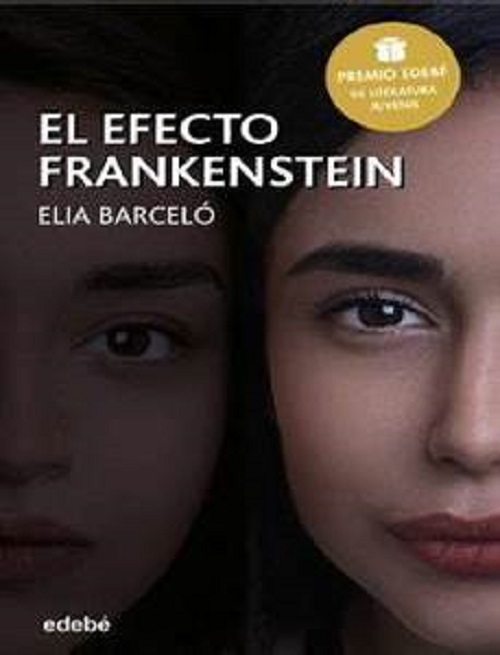
Despedida de Mercedes Cabello
Mercedes Cabello, profesora de Inglés y Jefa de Estudios durante varios años de nuestro centro, se despide de nosotros tras su jubilación.
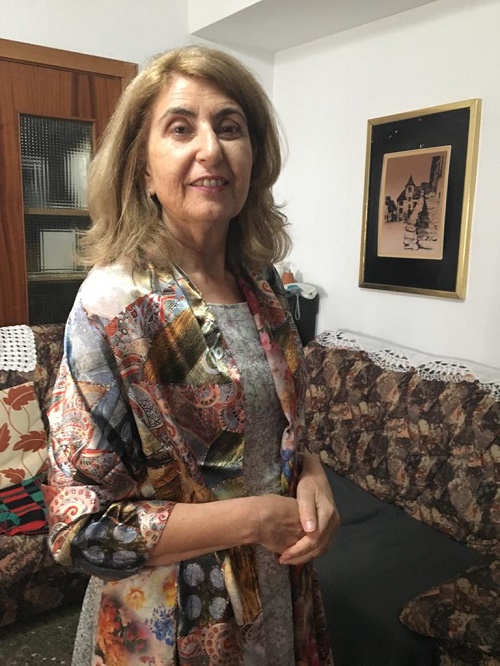
My dear students,
this is not just a formal beginning to convey my message. I mean it – you, my students, are dear to me.
2020 has brought a lot of changes- collective and individual changes, lots of habits to accept, lots of decisions to make. It was not easy for me to make the decision to retire from a profession I loved and enjoyed to the last minute.
I stop to think and I recollect your faces – your eyes and ears (concentrating), your smiles and sometimes tears that inspired me along the way to try and become a better teacher and a better person every day.
I remember the activities and trips we shared in which the use of English was just natural: our trips to Benidorm in order to interview foreign tourists. Our visits to art galleries or to a pottery museum, to the castle and treasure of Villena; our Erasmus exchanges with other countries: Italy, Romania, Poland; our German exchange, with Bochum as a destination. What about New York, New York…?
And what about the hours we spent rehearsing to play English literary jewels like The Canterville Ghost, Oliver Twist, The Picture of Dorian Gray or Much Ado about Nothing? Then, the amazing result of those rehearsals. What a pleasure to see you peform in front of different audiences: school friends, parents, grandparents,…
The way everyting was unfinished last academic year was not ideal. However, I am sure that every one of you learnt a few things from the situation.
Keep learning, my dear students! There will always be a Ghost that will need our help to finally rest in peace, or a Treasure Island to discover, or an Oliver Twist who will try hard to stay honest and true through all the misfortunes he might encounter in his way. Oh, there will be poetic justice in the end! Learning comes in so many different ways! Learn from your families, learn from your teachers, learn from your friends and from those who are not your friends. Learn from life above all.
I wish you all the best!

